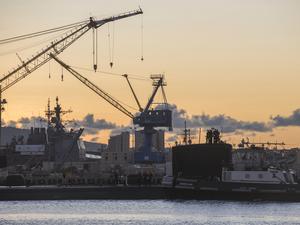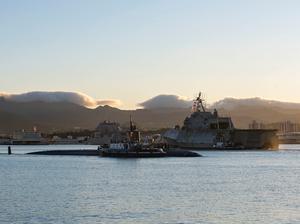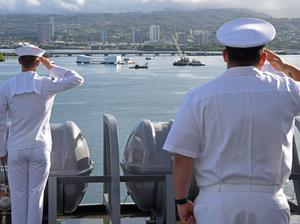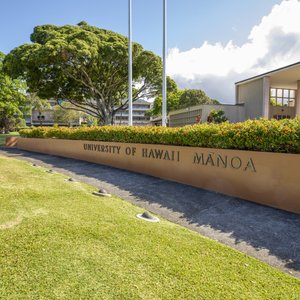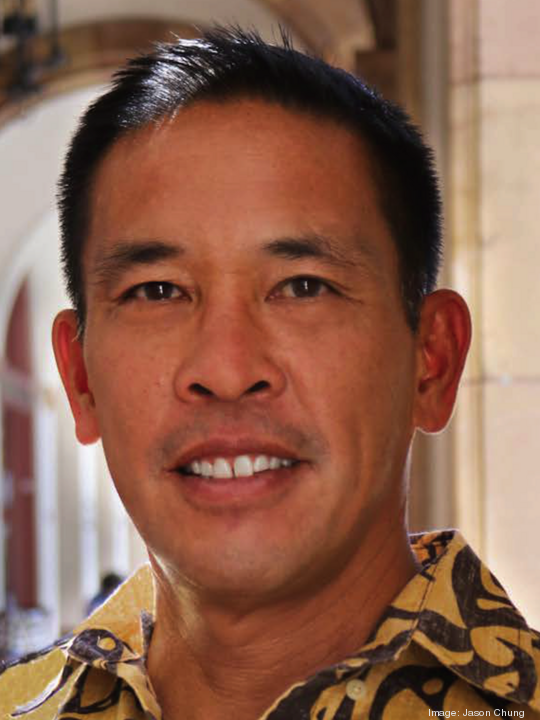
The military has been a reliable contributor to Hawaii’s economy — second only to tourism — and there is considerable room for growth from diversification, according to the Chamber of Commerce Hawaii’s Military Affairs Council.
Hawaii remains a highly strategic hub in the Asia-Pacific region and is home to the U.S. Indo-Pacific Command; more than 146,000 military members and their dependents live in Hawaii, per the state.
To complement them, about 7,000 civilians and contractors work at the traditional hub of military spending in Hawaii, the Pearl Harbor Naval Shipyard, comprising a significant portion of the roughly $7.5 billion a year in defense spending in the Islands.
The U.S. Department of Defense’s Office of Local Defense Community Cooperation lists Hawaii as No. 2 in the country for the highest defense spending as a share of state GDP, at 7.7%, behind only Virginia’s 10.9% in Fiscal Year 2019, the most recent year available. There were $2.5 billion in defense contracts awarded in the Islands that year.
As prominent a player that the shipyard is for the local economy — including an upcoming multibillion-dollar dry dock overhaul — there is a comparable opportunity for growth in emerging fields like cybersecurity, information technology, data science and intelligence, Jason Chung, vice president of the Military Affairs Council, told Pacific Business News.
The potential is there for “at least the same, if not more” jobs in those fields for Hawaii civilians as compared to roles like engineers, welders and pipe fitters at the shipyard, Chung said. In the years to come, such skills will be in demand spanning the branches of the military heavily represented in the Islands — Army, Navy, Air Force, Marines, Coast Guard and National Guard.
Chung, an Army veteran who served 30 years as an intelligence officer, has made it his mission since joining the MAC in 2019 to bridge his home state and the military. The MAC is comprised of local business leaders and retired U.S. flag and general officers and acts as a liaison with military command on behalf of the state.
On the horizon, Chung said, is the formulation of the Hawaii Defense Economy Alliance, combining government, military, traditional and emerging industries, academia, and other key stakeholders to expand contract opportunities for local businesses.
The new organization was born out of a study by the Department of Business, Economic Development and Tourism. It is being funded by a grant to the MAC from the DoD’s aforementioned Local Defense Community Cooperation.
How was military spending in Hawaii affected by the pandemic?
With Covid, we saw a significant impact to the economy, just like [the recession] in 2008, 2009. Fortunately, what we’ve seen both then and now, is that the defense sector was pretty resilient to economic downturn. We were very fortunate that we had the defense economy here because defense spending did not go down this year; in fact, it actually went up a little bit. So, it has been a way to still provide a lot of jobs and opportunities here in Hawaii.
What is the key to developing these emerging fields in Hawaii?
If you can actually grow your workforce here in Hawaii, it would just be so much more valuable to the defense industry [and the state]. The shipyard saw that [with its apprenticeship programs]. It’s just much more effective for us to have resident expertise able to do that.
So the great opportunity we have right now, as we look at this emerging industry, is how do we recreate the template and success that we have with the traditional industry like shipbuilding and ship repair. How do we build those relationships with the University of Hawaii and the other academic institutions here, [and] create internship programs with the Department of Defense? Parts and pieces of that are all happening right now, on the fringe. We’re moving in that direction to do that.
What can you say about the Hawaii Defense Economy Alliance?
[Its purpose] is to get all these key stakeholders to identify the challenges and opportunities that exist in the traditional [military economy] and this emerging industry. And so right now, we’re in the process of establishing the executive committee, as well as the four working groups that will then develop over the next 14 or so months — the different programs that we’re going to want to implement in this, to bring this to fruition and connect all the dots.
The desired end state [is] to be that we have a sustainable program that goes beyond just this grant. And that we’re able to expand opportunities for local businesses, create more jobs and diversification, and resiliency within the industry itself.
